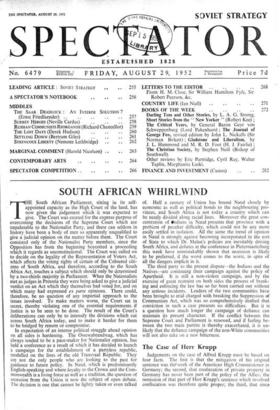SOUTH AFRICAN WHIRLWIND
• HE South African Parliament, sitting in its self- appointed capacity as the High Court of the land, has now given the judgement which it was expected to give. The Court was created for the express purpose of overcoming the decisions of the Supreme Court which are unpalatable to the Nationalist Party, and there can seldom in history have been a body of men so apparently unqualified to give a judicial opinion on the matter before them. The Court consisted only of the Nationalist Party members, since the Opposition has from the beginning boycotted a proceeding which it regards as unconstitutional. The Court was called on to decide on the legality of the Representation of Voters Act, which affects the voting rights of certain of the Coloured citi- zens of South Africa, and therefore, according to the South Africa Act, touches a subject which should only be determined by a two-thirds majority in Parliament. When the Nationalists met as judges in Pretoria they were being asked to give a judicial verdict on an Act which they themselves had voted for, and on which many had expressed ex parte opinions. There could, therefore, be no question of any impartial approach to the issues involved. To make matters worse, the Court sat in secret, thereby violating one of the essential requirements if justice is to be seen to be done. The result of the Court's deliberations can only be to intensify the divisions which cut across South Africa today, and to make it harder for them to be bridged by reason or compromise. In expectation of an intense political struggle ahead opinion on all sides is hardening. The Ossewabrandwag, which has always tended to be a pace-maker for Nationalist opinion, has held a conference as a result of which it has decided to launch a campaign for the establishment of a partyless republic, modelled on the lines of the old Transvaal Republic. They are not the only people who are looking to the past for guidance to future policy. In Natal, which is predominantly English-speaking and where loyalty to the Crown and the Com- monwealth is a living force as well as a tradition, the question of secession from the Union is now the subject of open debate. The decision is one that cannot be lightly taken or even talked of. Half a century of Union has bound Natal closely by economic as well as political bonds to the neighbouring pro- vinces, and South Africa is not today a country which can be neatly divided along racial lines. Moreover the great con- centration of Andians in Natal presents that province with a problem of peculiar difficulty, which could not be any more easily settled in isolation. All the same the trend of opinion in Natal is strongly against becoming incorporated in the sort of State to which Dr. Malan's policies are inevitably driving South Africa, and debates at the conference in Pietermaritzburg this week have unmistakably shown that secession is likely to be preferred, if the worst comes to the worst, in spite of all the dangers implicit in it.
The third party to the present dispute—the Indians and the Natives—are continuing their campaign against the policy of Apartheid. It is still a non-violent campaign, and by the exercise of great restraint on both sides the process of break- ing and enforcing the law has so far been carried out without any serious incidents. Leaders of the two communities have been brought to trial charged with breaking the Suppression of Communism Act, which was so comprehensively drafted that conviction in such a case presents no difficulties. But it is a question how much longer the campaign of defiance can maintain its present character. If the conflict between the Supreme Court and Parliament is renewed, and if feeling be- tween the two main parties is thereby exacerbated, it is un- likely that the defiance campaign of the non-White communities will not also take on a new bitterness.


































